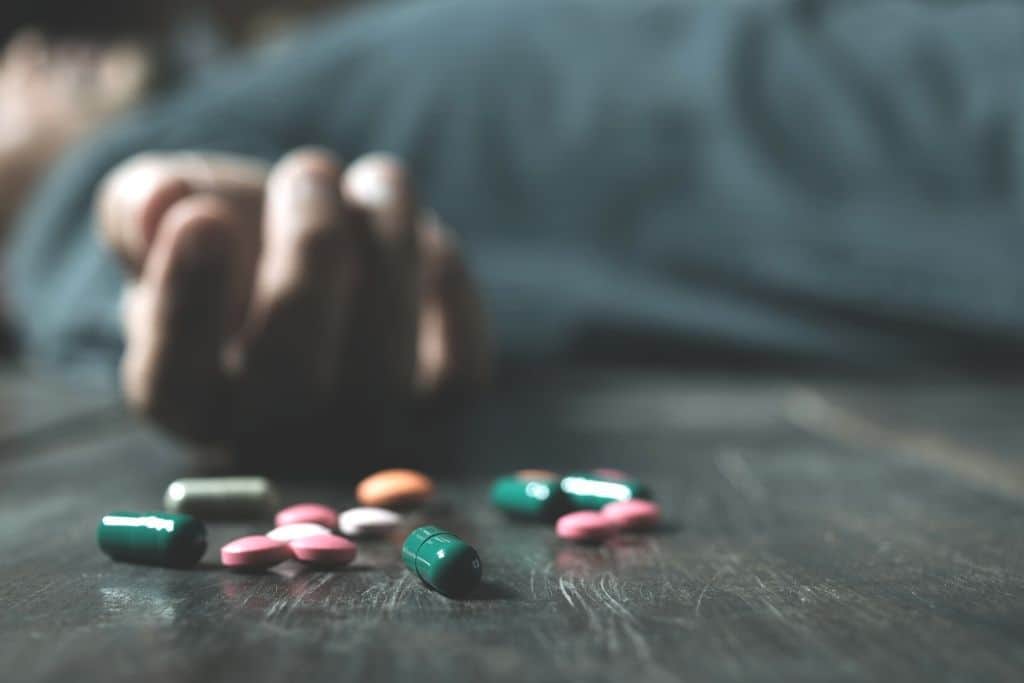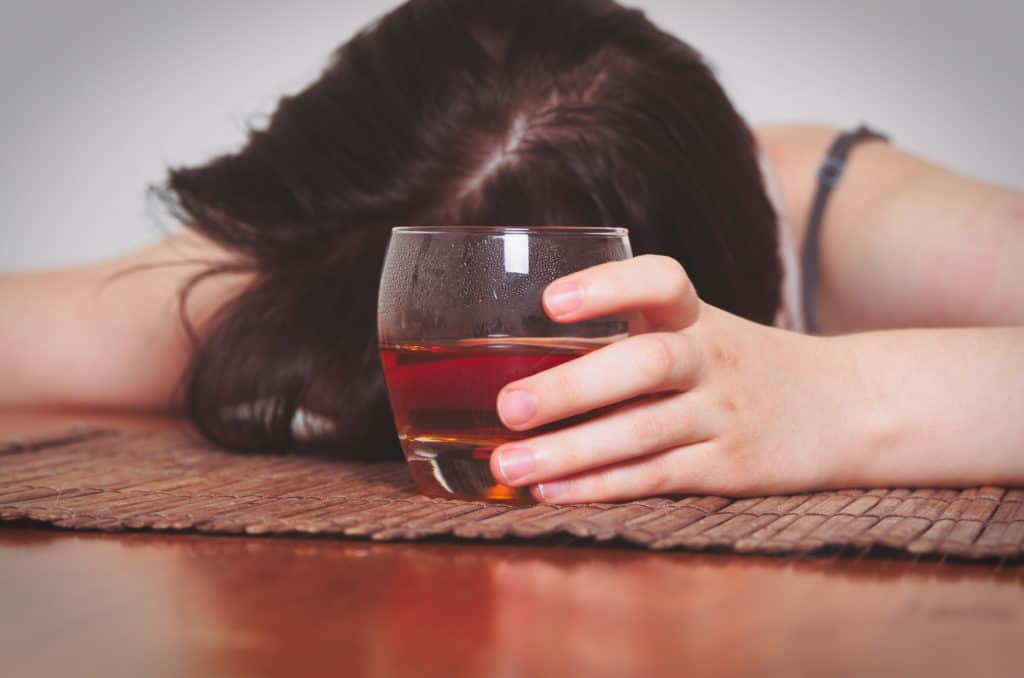How GHB is Used
GHB drug (Gamma Hydroxybutyrate) is a depressant that occurs naturally in the brain and has sedative and anesthetic effects. Depressant substances slow down the brain’s activity and other parts of the central nervous system [1]. Other drugs that have depressant effects include alcohol, heroin, and benzodiazepines. In addition, recreational use of the drug can quickly progress to GHB drug addiction, and quitting the drug can be hellish and often leads to withdrawal from GHB. Recovery professionals recommend beginning the first phase of treatment in a supervised facility. This will all start by undergoing medically assisted GHB detox in an inpatient drug rehab.
GHB can give users a feeling of euphoria and increase their sex drive. But increasing the dose by a fraction, even less than a milliliter, can be fatal. Overdosing on GHB – which is particularly easy when mixed with alcohol or other drugs and when the strength in bottles varies – can make people incoherent, suffer convulsions, lose consciousness and stop breathing altogether [2]. People can become physically dependent, and withdrawal can be life-threatening.

The drug GHB (gamma-hydroxybutyrate) occurs in two forms:
- Sodium oxybate or gamma-hydroxybutyrate sodium goes by the trade name Xyrem and is approved for the treatment of the sleep disorder narcolepsy. Xyrem is classified as a Schedule III controlled substance.
- GHB also refers to a synthetic and illicit version of the drug that is classified as a Schedule I controlled substance by the DEA. This article focuses on the issues associated with the illicit version of GHB.

Get Your Life Back
Find Hope & Recovery. Get Safe Comfortable Detox, Addiction Rehab & Dual Diagnosis High-Quality Care.
Hotline(844) 597-1011How GHB Works
Colorless and odorless, the drug is often used to spike the drinks of women, knocking them out or making them unable to stop a sexual advance. Once ingested, it takes effect within 10 to 20 minutes and lasts up to four hours. The drug causes those who have ingested it to suffer a complete blackout, making it difficult to press charges against an aggressor.
Some experts consider GHB more dangerous than other so-called date-rape drugs because it can be easily manufactured in home labs from readily available ingredients. The ingredients are frequently sold over the Internet to teens and young adults. The drug can be extremely dangerous, causing seizures, severe respiratory depression, and fatal comas. The U.S. Drug Enforcement Administration has documented 72 deaths relating to GHB and its derivatives.
GHB comes in a few forms including:
- A colorless, odorless, bitter, or salty-tasting liquid – sold in small bottles or vials
- A colored liquid
- Crystals or powder (this is less common).
Common Effects of GHB
Generally, the effects of GHB are felt within 15 minutes and last for around three hours. GHB effects vary greatly depending on the amount used. A small increase in amount can result in a dramatic increase in its effects. This is one of the most dangerous aspects of using GHB. There is a very small difference between the amount a person may take to produce the desired effect and the amount that results in GHB overdose.
In moderate amounts, GHB can produce feelings of:
- Relaxation
- Drowsiness
- Sociability
- Euphoria
- Lack of inhibition
- An increased urge for sex
- Heightened sensitivity to touch
High Dose Effects of GHB
High doses of GHB can result in:
- Dizziness
- Vomiting
- Tremors
- Tunnel vision
- Loss of coordination (ataxia)
- Confusion, irritation, and agitation
- Hallucinations
- Blackouts and memory lapses
- Seizures
- Coma
- Respiratory arrest (stopping breathing) and death
Get Help. Get Better. Get Your Life Back.
Searching for Accredited Drug and Alcohol Rehab Centers Near You?
Even if you have failed previously and relapsed, or are in the middle of a difficult crisis, we stand ready to support you. Our trusted behavioral health specialists will not give up on you. When you feel ready or just want someone to speak to about therapy alternatives to change your life call us. Even if we cannot assist you, we will lead you to wherever you can get support. There is no obligation. Call our hotline today.
(844) 597-1011Can I Become Dependent on GHB?
Regular users of GHB can develop a tolerance to the drug very quickly. This means they need more of the drug to get the same effects. It is also possible to become dependent on GHB, which means people spend a lot of time thinking about the drug and trying to get it.

GHB dependence can be psychological, physical, or both. People who regularly use GHB can develop tolerance and dependence very quickly. This means they want to take larger and larger doses to try and achieve the same effect. However, this tends to increase the intensity of the unpleasant side effects instead.
Despite the claims of many users, GHB is addictive. When someone starts taking it recreationally, they’ll find that they develop a tolerance and need to take more to feel the effects. Given how potent the Depressant is, however, even an extra dose of it can put the user way over and into a life-threatening condition. When someone has reached this point, a dependency is not far behind.
Can GHB Cause Long-term Problems?
Using GHB long-term can cause memory problems, heart disease, hallucinations, anxiety and breathing problems. Using GHB long-term can cause memory problems, heart disease, hallucinations, anxiety and breathing problems. Using GHB long-term can cause memory problems, heart disease, hallucinations, anxiety, and breathing problems.
Can You Overdose on GHB?
Yes. Overdosing on GHB is a common side effect because of the potency of the chemical and unpredictability between batches. Symptoms of liquid GHB overdose include confusion, hallucinations, seizures, and comatose unconsciousness. Severe GHB overdose results in respiratory distress.
Overdosing on GHB is very easy. There is a fine line between how much is needed to feel its euphoric effects and how much could send a person to the hospital. GHB is dangerous to overdose on because it is an efficient sedative that can cause the heart and breathing to stop.
Symptoms of GHB Overdose
The potential for GHB overdose is possible and can be heightened by a mixture of other drugs and/or alcohol.
Symptoms of GHB overdose may include:
- Incoherency
- Profuse sweating
- Vomiting
- Irregular or shallow breathing
- Involuntary muscle contractions
- Inability to stand
- Unconsciousness
Seek medical attention immediately if you believe you or someone you love may be experiencing a GHB overdose.
Signs of GHB Overdose
The risk of GHB overdose increases when this drug is combined with other drugs such as alcohol. Taking GHB with other depressant drugs is particularly dangerous. Combining GHB with alcohol can lead to nausea, vomiting, and unconsciousness, even at low-dose levels.
Signs of GHB overdose include that the person:
- Appears to be asleep but cannot be woken
- Is incoherent, sweating profusely, vomiting, and has irregular or shallow breathing
- Is not able to stand, has involuntary muscle contractions, or both.
GHB that is not manufactured correctly may result in a highly toxic mixture of GHB and sodium hydroxide.
First-class Facilities & Amenities
World-class High-Quality Addiction & Mental Health Rehabilitation Treatment
Rehab Centers TourRenowned Addiction Centers. Serene Private Facilities. Inpatient rehab programs vary.
Addiction Helpline(844) 597-1011Proven recovery success experience, backed by a Team w/ History of:
15+
Years of Unified Experience
100s
5-Star Reviews Across Our Centers
10K
Recovery Success Stories Across Our Network
- Low Patient to Therapist Ratio
- Onsite Medical Detox Center
- Comprehensive Dual-Diagnosis Treatment
- Complimentary Family & Alumni Programs
- Coaching, Recovery & Personal Development Events
GHB Overdose Treatment
Can too much GHB kill you? The answer is yes, a person can die from a GHB overdose if their heart rate or breathing stops. However, the likelihood of a GHB death is low if the person can receive medical care soon after overdosing.
Blood drawn from patients admitted to emergency departments for a GHB overdose has found levels of the drug ranging from 29 to 490 mg/L, with several fatalities reported at levels of 400 or above. The International Association of Forensic Toxicologists estimates a level of 280 mg/L is sufficient to lead to death.
Emergency departments see many cases of GHB overdose that present virtually indistinguishably from other substance overdoses (e.g., generally a profoundly decreased level of consciousness and potential respiratory compromise).
As such, GHB overdose treatment will begin by maintaining the airway through a breathing tube, gaining IV access for fluid replacement, and other supportive measures. No antidote is available for GHB intoxication.
Pending blood toxicology reports to confirm the specific substance involved, other overdose treatments may be used, including:
- Activated charcoal to eliminate the drug and prevent further absorption.
- Ethanol drip (should patients be acidotic and methanol ingestion has yet to be ruled out).
In addition, withdrawal may complicate recovery following GHB overdose treatment. However, there are GHB treatments for withdrawal and its related symptoms which include benzodiazepines. Symptoms of GHB withdrawal can include insomnia, tremors, increased heart rate, and psychotic thoughts.
Treatment for a GHB Overdose and Addiction
How long does GHB stay in your system? GHB is quickly eliminated from the body. If a person receives medical care soon after overdosing, they are likely to regain consciousness and fully recover within 1.5 to 6 hours.
Since many people who experience symptoms of GHB overdose are abusing the drug or other substances, it is recommended that recovering users seek help at an addiction treatment program. A wide variety of options are available to help the person stop using drugs or alcohol and avoid serious side effects from substance abuse. Many GHB users respond well to residential rehab programs.
If you are experiencing withdrawal GHB, it’s crucial to first get an accurate assessment of all the symptoms. When the symptoms have been evaluated by a mental health professional, it may be determined that another form of mental condition is present and needs a particular type of treatment. Very often, some combination of psychotherapy, medication, and/or lifestyle changes are effective for coping with functional.
Medically-Assisted Detox
Detox is often considered the first stage of treatment. It will help you navigate the complicated process of GHB withdrawal, but it doesn’t address patterns of thought and behavior that contribute to drug use. Various treatment approaches and settings can help provide the ongoing support necessary to maintain long-term sobriety after you complete detox.
Cravings are very common during detox and can be challenging to overcome. This often leads to relapse. Constant medical care provided during inpatient treatment helps prevent relapse. Clinicians can provide necessary medication and medical expertise to lessen cravings and the effects of GHB withdrawals.
World-class, Accredited, 5-Star Reviewed, Effective Addiction & Mental Health Programs. Complete Behavioral Health Inpatient Rehab, Detox plus Co-occuring Disorders Therapy.
CALL(844) 597-1011End the Addiction Pain. End the Emotional Rollercoaster. Get Your Life Back. Start Drug, Alcohol & Dual Diagnosis Mental Health Treatment Now. Get Free No-obligation Guidance by Substance Abuse Specialists Who Understand Addiction & Mental Health Recovery & Know How to Help.
Psychotherapy
Several different modalities of psychotherapy have been used in the treatment of mental health disorders along with addiction, including:
- Cognitive Behavioral Therapy (CBT) – is an effective treatment that involves making changes in both the patterns of negative thoughts and the behavioral routines which are affecting the daily life of the depressed person for various forms of depression.
- Dialectical Behavioral Therapy – is a comprehensive mental health and substance abuse treatment program whose ultimate goal is to aid patients in their efforts to build a life worth living. The main goal of DBT is to help a person develop what is referred to as a “clear mind.”
- Person-Centered Therapy – is a strategy that allows and encourages clients to understand and resolve their concerns in a safe, supportive environment.
- Solution Focused Therapy – is an approach interested in solutions that can be quickly implemented with a simple first step leading to further positive consequences.
Dual Diagnosis Treatment
Drug abuse and mental health disorders often co-occur. In many cases, traumatic experiences can result in a mental health disorder and substance abuse. Dual diagnosis rehabilitation treats both of these issues together. The best approach for the treatment of dual diagnosis is an integrated system. In this strategy, both the substance abuse problem and the mental disorder are treated simultaneously. Regardless of which diagnosis (mental health or substance abuse problem) came first, long-term recovery will depend largely on the treatment for both disorders done by the same team or provider.
Medication-Assisted Treatments
Medication-Assisted Treatments (MAT) for substance use disorders and mental health disorders are commonly used in conjunction with one another. This includes the use of medications and other medical procedures. During your rehab, the staff from your treatment facility will help you identify what caused your addiction and teach you skills that will help you change your behavior patterns and challenge the negative thoughts that led to your addiction. Sometimes, the pressures and problems in your life lead you to rely on substances to help you forget about them momentarily.
If you or a loved one are struggling with long-term drug abuse and a co-occurring mental health condition such as depression, contact one of our helpful treatment specialists today. We Level Up can provide information on dual diagnosis and detox programs that may fit your specific needs.

Experience Transformative Recovery at We Level Up Treatment Centers.
See our authentic success stories. Get inspired. Get the help you deserve.
Start a New Life
Begin with a free call to an addiction & behavioral health treatment advisor. Learn more about our dual-diagnosis programs. The We Level Up Treatment Center Network delivers recovery programs that vary by each treatment facility. Call to learn more.
- Personalized Care
- Caring Accountable Staff
- World-class Amenities
- Licensed & Accredited
- Renowned w/ 100s 5-Star Reviews
We’ll Call You


